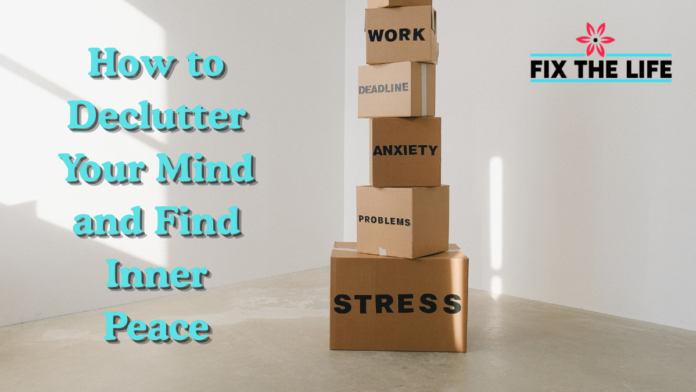In today’s hyperconnected, always-on world, it’s easy for our minds to feel cluttered. Between work pressures, social media, constant notifications, and personal worries, mental overload has quietly become the norm for many people. The good news is — you can change that.
Learning how to declutter your mind is one of the best steps you can take toward mental clarity and emotional wellness. It’s not about emptying your head completely, but rather about organizing your thoughts, letting go of unnecessary mental baggage, and creating space for calm, focus, and peace.
Why Mental Clutter Happens
Before we jump into the how, it’s important to understand the why. Mental clutter usually builds up from unresolved stress, overcommitment, constant digital distractions, and unprocessed emotions. Just like a messy room, a cluttered mind makes it hard to focus, relax, or make decisions.
Example: If you find yourself forgetting things, feeling scattered, or unable to sit still without checking your phone, chances are your mind could use a good clean-out.
1. Practice Mindful Journaling
Writing down your thoughts is one of the most effective ways to declutter your mind. Journaling helps you process emotions, untangle complicated feelings, and see your worries more clearly.
Tip: Set aside 5-10 minutes each morning or evening to jot down whatever’s on your mind. Don’t worry about grammar or structure — this is for you, not anyone else.
2. Limit Digital Overload
Your brain isn’t built to process constant streams of information. Scrolling social feeds, endless notifications, and 24/7 news can crowd your mental space.
Emotional Wellness Tip: Turn off non-essential notifications and set specific times for checking emails and social media. Even 24 hours of unplugging once a week can dramatically improve mental clarity.
3. Learn to Say No
Taking on too much — whether at work, socially, or at home — clutters your mind with obligations and stress. One of the healthiest habits you can develop is learning to say no without guilt.
Example: If a new commitment doesn’t align with your priorities or adds unnecessary stress, politely decline or defer.
4. Meditate for Mental Clarity
You don’t have to be a monk or meditate for hours to reap the benefits. Even a few minutes of focused breathing or guided meditation daily can help clear mental fog and promote calm.
Pro Tip: Start with just two minutes of deep breathing before bed or when you wake up. Apps like Calm or Insight Timer offer free, beginner-friendly options.
5. Declutter Your Physical Space
Believe it or not, physical clutter affects mental space. A messy desk, overflowing inbox, or chaotic living area creates visual noise that overstimulates the brain.
Happiness Tip: Tidy up one area at a time. Clean your workspace, clear out your email, or organize a drawer. Small wins lead to a noticeable sense of relief.
6. Practice Single-Tasking
Multitasking might feel productive, but it actually scatters your focus and increases stress. Shifting your attention constantly creates mental clutter.
Emotional Wellness Tip: Commit to doing one thing at a time — whether it’s eating, working, or even relaxing. You’ll be more present and feel calmer.
Recommendation
7 Fitness Trends for 2025 You Should Know About
Signs You’re Experiencing Burnout and How to Recover Quickly
New Jersey’s Best Physical Therapist for Pelvic Floor Issues
How Long Does Implantation Bleeding Last?
7 Common Health Issues Faced by Students
FAQ
Q1: How can I tell if my mind is cluttered?
A: Common signs include constant overthinking, restlessness, difficulty focusing, and feeling mentally exhausted without a clear reason.
Q2: How long does it take to declutter your mind?
A: It varies. You might feel immediate relief from a journaling session or digital detox, while deeper emotional clutter takes consistent practice to clear.
Q3: Can physical decluttering really improve mental clarity?
A: Yes — research shows that visual clutter competes for your brain’s attention, reducing focus and increasing stress. Tidy spaces promote calm.
Q4: What’s the easiest first step to start clearing mental clutter?
A: Start with mindful journaling or a brief digital detox. Both are simple, require no special tools, and deliver quick, noticeable benefits.
Q5: How does meditation help declutter the mind?
A: Meditation quiets the constant mental chatter, lowers stress hormones, and teaches you to let go of intrusive thoughts — promoting mental clarity and peace.
Final Thoughts
Learning to declutter your mind is one of the most valuable emotional wellness tips you can follow in a noisy, fast-paced world. By setting boundaries, simplifying your space, and giving your thoughts a healthy outlet, you create room for peace, clarity, and genuine happiness. Start small, stay consistent, and watch how quickly your headspace transforms.




